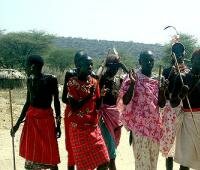Land, livelihoods and identities: Inter-community conflicts in East Africa
Issues:Competition over resources, Marginalisation
In a report published in December 2011, Minority Rights Group International highlights the problems facing minority groups, specifically in an area covering Kenya, Uganda and Jonglei State in South Sudan. Competition over resources has increased the potential for confrontation not only with local dominant ethnic groups, but also with the state and international corporations, thereby increasing the liklihood of different forms of conflict on different levels. Progressive legal protections are often not enforced because of a disconnect at state-level between legislation and law-enforcement, which only exacerbates existing problems caused by long-standing discrimination. Moreover, conflict involving already marginalised people adversely affects the women and children in these groups in particular, which in turn re-impacts on the community because of the traditional roles that women play in family cohesion and as food producers.
Many problems arise not simply because people belonging to minority groups are themselves marginalised, but also their community and governance structures which previously had been successful in mediating conflict such as (in an East African context) cattle raiding. Marginalisation not only discriminates against individuals because of their backgrounds or beliefs but also rides roughshod over communal organisation and mediation, leaving groups unable to adapt to change or protect their interests when threatened by more powerful entities.
Executive Summary, by Laura A. Young and Korir Sing'Oei
In resource-scarce East Africa, minority groups face major challenges over the control of and access to land and other natural resources. Despite national policy regimes that are developing in a positive direction, the reality for minority groups and their neighbouring ethnic groups is that land and natural resources continue to be a major trigger of violence. Minorities find themselves competing with other communities, with the state, and with corporate interests for control of resources upon which they depend for their livelihood, cultural integrity and future development.
As globalization, population explosion, and climate change converge to increase the demand for land, water, forest products and mineral resources within territories inhabited by minorities in East Africa, these groups are forced to find new ways to cope with different types of conflict at once.
This report describes the situation of selected minorities and their neighbouring groups in Kenya, Uganda and South Sudan’s Jonglei State. Each group has unique characteristics, including extreme livelihood challenges, vulnerability to conflict, and ongoing discrimination, which are common across communities and countries. Decades of discrimination against minority groups, often as a result of state policy starting in the colonial era, has rendered minorities in East Africa poorer and with more precarious access to land and natural resources than other communities.
Minorities face such serious challenges for numerous reasons: legal regimes remain unimplemented or result in further discrimination against minority groups; there are existing conflicts between formal and customary laws; population pressures and climate change; lack of coordination in conflict resolution programming and donor support, and non-recognition of indigenous livelihoods by states.
Resource conflicts and discrimination lead to negative consequences for women from these communities in particular, as they face double discrimination because of deeply entrenched patriarchy. Conflicts between formal and customary laws often leave women with limited options to protect their access to land and natural resources. Given the place of women in the social system of most minority groups, in which they are responsible for production of food, denial of access has negative effects on the community overall and specifically on women and children. Women also often bear the brunt of conflicts over natural resources. Security operations to quell violence or evict communities expose women to multiple violations of their rights. Moreover, violence between communities leads to attacks on women and children and directly impacts women’s particular property rights within traditional community structures.
The research for this report reveals that communities often struggle with multiple types of conflict at once: interethnic competition; conflict with the state; and conflict with corporate actors. Each of these types of conflict requires a different method of resolution. The report highlights that communities themselves are initiating the most effective conflict resolution methods when it comes to inter-ethnic violence, most often associated with cattle raiding in pastoralist communities. Effective conflictresolution strategies often draw on customary practices, integrated with modern technological advances. The report highlights that national law and policies often contradict and undermine customary practices. Moreover, current conditions of land scarcity, state intervention and resource extraction are straining or obliterating customary management in many communities.
State-led policy initiatives to resolve conflict between communities and state or corporate actors have not proven successful because of lack of implementation and failure to effectively consult minority communities’ traditional governance structures. Accordingly, many communities, such as the Endorois, have been forced to become legal adversaries of the state, addressing conflict through litigation at the national and regional level.
This report recommends that governments in the regions discussed take urgent action to adopt and implement their national policy directives on land and natural resources. These policies are generally progressive with respect to minority rights and provide a strong basis for supporting the other recommended actions in the report.
Among other key recommendations, this report urges national governments to develop guidelines on what constitutes participatory and effective community consultation around land and natural resource extraction, based on free, prior and informed consent; and recognize the value of indigenous peoples’ knowledge of resource management and of customary practise, especially related to women’s rights to hold and use land.
To read the full report and press release, click here
Image Source: Leonie_x
 Delicious
Delicious Digg
Digg StumbleUpon
StumbleUpon Reddit
Reddit
Posted on 31/12/11
